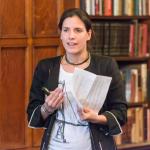Yet, not often do we historians too ask how economists’ values should be handled in our writing.
One way to deal with such values is to consider them a symptom of one or several economist’s ideology or political beliefs. In such framework, scientific work is consciously or unconsciously subdued to the pursuit of an agenda, be it the defense of neoliberalism, of Western democracy, of individual freedom, of rational choice as a guide to consumption, production procreation, etc.
It is however possible to conceive values in a sense that doesn’t entail that the production of scientific knowledge is twisted, changed or distorted by personal features (which presupposes the reference to an external and pure yardtick). The historian simply assumes that scientific endeavours are a way to make sense of (value) the world. Economists’ practices thus simply embody a set personal features to which I like to refer as a worldview. In that sense, value-laden means “personal”
Some historians have investigated the role of values in institutional practices: the career one pursues, the patrons one negociates with, the institutions, the places, the alliances, the ennemies. Economists’ individual trajectories reflect, for instance, what it meant to be a Jew at Harvard or Chicago in 1938 or 1947, and which recruiting opportunities were offered to European refugees in 1944. The combination of individual trajectories in turn created patterns that dramatically affected the development of economics at Harvard, MIT or Cowles.
Values are also reflected in the knowledge itself. The historian who seriously deals with this possibility should be prepared to face economists’ claim for one peculiar kind of objectivity: that another scholar could have produced the exact same piece of resarch. That is, the idea that science properly done (by means of quantifying, modeling and formalizing among others) depersonifies knowlegde. Lately, I’ve found this claim disturbing, and, to some extent meaningless.
It’s not only that the economist’s worldview informs the choice of questions, hypotheses, modeling tools, procedures to confront hypothesis with facts, and ways of observing, quantifying and ultimately building such facts. I don’t understand (anymore) what scientists gain in advocating the depersonification of their practices and products. For giving flesh to knowledge does not make it less scientific. Game theory reflected Von Neumann’s pressing need to reclaim an undertanding of the social order that had seemingly dissolved in the turbulences of the thirties. Marschak’s theory of decision under uncertainty testifies to his attempt to navigate in between radical uncertainty and Hilter’s claim that history is deterministic and his rise inescapable. Debreu’s use of mathematics with a bourbakist vintage reflects his own struggle for a life in order and silence. None of the above characterizations diminish the underlying scientific achievements. Acknowledging the personalization of economic knowledge doesn’t jeopardy its confrontation, critical scrutiny, diffusion (although led to an extreme, such stance may rule out strict reproducibility). In other words, personal is no synonym for subjective.
Such viewpoint is also consequential when writing on economists’ interactions with one another. In the same way “sciences in the Cold war” are not merely “Cold war sciences” (that is, determined by the impratives the material and intellectual fight with USSR), economics in the postwar period is not the creature of a Keynes, a Hayek, a Von Neumann, a Samuelson, a Simon or a Lucas. Overdetermining the nature of postwar macreconomics, general equilibrium theory, decision theory or MIT/Chicago/Carnegie/Michigan style economics by subsuming it to the vision of a single individual is, in some way, akin to depersonalizing it. Historians Joel Isaac and David Engerman call for middle-range stories of postwar science. Those would enable a refined assessment of the genuine impact of postwar patrons’ agenda on the content of the research they fund, of the ties to prewar intellectual debates and of the framing effect of the changing institutional academic context, they argue. Middle range narratives are also wanted because they represent a crucial historigraphical space where historians combine vision-laden scientific endeavours into a collective ethos, without the convenient reliance standardizing power of Cold war, political, technological metarrative or the conforting secret motives of superheros – and villains.
Back to the excruciatingly difficult task of finding an aggregation procedure that respects the personal character of scientific endeavours







